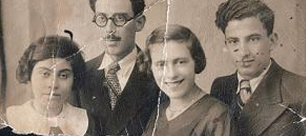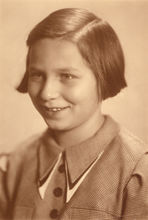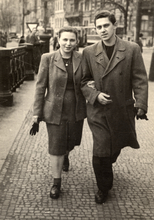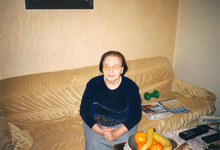From the Centropa Biographies - Dagmar Simova

Dagmar Simova
Born 1928 in Prague
Country: Czech Republic
City: Prague
Interviewer: Lenka Koprivova
Date of interview: March - April 2006

Subtitle: Dagmar in 1939, before her departure to England.
The decision that I should go to England took place sometime after the occupation. Then it all went lickety-split, I was supposed to leave on a transport in July [1939]. My sister was also supposed to go, and we'd been picked out by some family, that we'd be staying with them. But then my sister broke her leg, and what then happened is something I'll never forgive my parents. They said that she can't go anywhere with a broken leg, and that she won't leave until the September transport, when she's well. As is known, the September transport never left. The family that I was supposed to live with backed off, they wanted siblings, so that it would be easier, so then it was in some way arranged with those uncles of mine, who were both already in England, so I was told that I'd go visit my uncles for the summer holidays, which I was terribly looking forward to doing. When I was saying goodbye to my parents and my whole family, I had no inkling of how things would end up, that I'd never see them again. I can't imagine that my parents wouldn't have been afraid for me, but doubtlessly their fear was less than that of parents that had no idea of what was going to happen to their child.
I took tons of talismans from my teachers and girlfriends with me to England. Unfortunately over time they've all either been lost or something has happened to them... For example, one of my teachers, whom I liked very much, gave me this blue glass bear on a blue, transparent ice floe. I used to take it everywhere with me, until one time I had it on the edge of a pool during swimming races, someone kicked it and it broke. For years on end I then kept at least the shards in a bag. I also had this doll that was eaten by moths...and so on.
I remember that I couldn't wait to ride on a ship; I'd never been by the sea before. But, unfortunately, we crossed at night, so I was terribly disappointed. There were many children with me in the transport, whom I then also met in the Czechoslovak school in Wales; a young girl who was accompanying us later married our Czech teacher.
When I arrived in England, I didn't know a word of English. At first my uncles tossed me back and forth. So initially I lived with Jan in London, who had a villa rented with his family. Their children were younger than I was. I was terribly bored at their place. We constantly had to be out in the yard. I wanted to read, they wanted to play with me. So I was glad when I then moved in with the other uncle, Josef, there I liked it, because my cousin was two years old, and didn't want to play yet. So I was let out among the children in the street so that I'd learn some English. But what happened was that in fourteen days my girlfriends there spoke on the whole decent Czech, but I not even a word of English. I was simply a strong personality, and demanded Czech.
When Grandpa sold those Litice shares of his, he divided up the resulting revenues among his three children. Uncle Jan was already in England, and because they knew that I'd be going there too, my mother transferred her portion to England too, and it was basically intended for me. It paid for the boarding school that I entered. There were a lot of boarding schools in England, and it was considered to be this better education, especially because this school was considered to be something posh, because Mrs. Churchill had studied there in her youth.
I loved it there at that school. When I started, I knew almost no English, so they gave me to Jenny to look after. And she looked after me perfectly. Along with another girlfriend, Sheila, who was the granddaughter of some long-ago premier. Those two girls were excellent, and Jenny and I are best friends to this day. When during Communism we weren't allowed to leave the country, Jenny used to come visit me here. We have a cottage near Mirotice, so she used to come to our cottage, which she really liked. My grandchildren have known her from birth, just imagine that. I always told them, that is my own children too, but mainly my granddaughters didn't want fairy tales when they were little, but instead begged for me to tell them stories from my life. So I told them about the various mischief we used to get into, and also about how this Jenny took care of me, how I'd been sad that I was in a foreign country and didn't understand anyone...
Well, and now my granddaughters are going to school, and both of them are taking care of someone. And they're terribly proud of it. Right the first day of Grade 1, when she returned from school, the younger one, Veronika, told me, 'Grandma, I'm looking after Goran. He's a refugee from Croatia. He can't speak Czech.' And then she looked after some Georgian girl. The older one, Marketa, looked after a little Chinese boy. So when you imbue children already from childhood with some experiences...
Children in England started school at the age of five, not at six like here. So that I'd be among children of my own age, I had to take some tests, and because I did well at them, I even went a grade higher, so I was two years ahead. At school I learned English very quickly. The first year I still had a few problems, but on the other hand the entire class took advantage of this when they weren't sure of themselves. They told me to hold things up, what I should ask the teachers about...and I obliged them, gladly. I've got to say that my surroundings accepted me very well. The English are very friendly people.
Besides me, there was one other Czech girl, a bit younger than I, in the English boarding school. We weren't supposed to talk to each other, which is why they put us each at different ends. But when it was possible we talked to each other anyways, and decided that because we were terribly homesick, that we'd return home. That we wouldn't stay in England any longer. The war was raging on, but we simply decided that we'd return. We had it planned that we'd hitchhike, she to Prague, I to Strakonice. We squirreled away cookies, because nothing else would keep, until the day came when we said, 'All right, tonight we're taking off.' And we took off. We crawled out of a window in the hallway onto a fire escape... and that's as far as we got. Someone saw us, so someone nicely explained to us that this just wouldn't do... It was sometime in 1939. There was no bombing yet; we didn't even know what war looked like.
I was at that boarding school until 1944. Then, at the age of 16, I graduated. Their system is a little different from ours; each university has some high schools that fall under it that they take care of during graduation. In the spring university professors arrive and the students do the oral part of their graduation exams. Then in June written exams are sent to all the schools, and everyone writes them on the same day. And all summer you wait in suspense how it ended up, the results aren't published until August, in the newspapers. Those that pass their exams with honors can right away register with a higher grade of high school graduation and go to university. This I managed, I had Oxford final exams, and now what? Though I was at boarding school, I didn't forget my Czech, I was at home with my uncles for a relatively long time three times a year. A month at Christmas, a month at Easter, and two months during the summer. But my level of knowledge was at a 5th grade level. And because there was a Czech school in Wales, they put me there for that last year.
In that Czechoslovak school they divided children into classes by age. That's why I couldn't go straight into oktava [8th year], but had to go into sexta [6th year].
We didn't have any information about what was going on at home. We were able to keep in touch with our parents only up until the war broke out. Then for some time it was still possible through friends in Switzerland, but soon not even this. During the last years of the war news of the horrors that were going on here gradually began to filter through. Right after the war ended there were lists from the Red Cross that came, but they were unreliable and a person didn't find out much from them. I found only my mother in them, that she'd died while still in Terezin, where there were still relatively well-kept records. With those that had continued on it was worse, we had only very scant information at our disposal. I found out gradually what had happened to my family. When I was returning to Czechoslovakia, I knew only what had happened to my mother, otherwise nothing.
I actually returned as soon as it was possible, with Uncle Josef's family on the first repatriation transport.
When I arrived in Czechoslovakia, right away I started trying to find out who'd survived. It was clear to me that if someone was to return, our meeting point would be Strakonice, only there could we meet, otherwise no one had anyone's address. We kept asking around in Strakonice, but nowhere, nothing. At the time I was going there, I still needed a pass into the American zone. At the U Hybernu building in Prague, the Red Cross had lists posted, so I used to go there to have a look too. Finally my two cousins from my father's side returned, from my mother's side, no one. The last thing I found out, about a year after the war, was that my father had died in Auschwitz.
Possessions that my parents had hidden with friends were returned to me without a problem. That which had been confiscated, furniture, the car, my father's office, nothing remained of that anywhere. Overall I've got to say that I was very warmly received in Strakonice. Everyone greeted and hugged me, reminisced about my father... my father really was very popular.
Upon my return I initially lived with Uncle Josef, who had an apartment on Hradcanske Namesti [Hradcany Square]. But very soon he left for Belgrade as an ambassador, and I stayed with my grandmother's sister-in-law, who I'd never met up till then.
The next year I already knew that I'd be entering university, so in the summer I was able to go to Most to work in the coal brigade. We worked in a surface mine, loading wagons. Both boys and girls, even though there weren't too many girls there. It was terrible. We also worked night shifts. But after some time they saw that girls really can't do that type of work, and so scattered us about to different camps into the kitchens. I shared a room with one medical student who was dating my future husband, Vladimir Sima. That's how I met him. That was one positive thing about the brigade. The second was that we got paid for the work, which back then wasn't insignificant. We also got vouchers for clothes and shoes, and most importantly, a share of the coal. So the coming winter we already had a cellar full of coal, and we weren't cold. And because we used up a lot of it, we then also got a larger ration.
In our faculty it was also good, until they threw me out. Did I have problems from having been in England... mainly I had problems due to the fact that I had no guardian.
As soon as I turned 21 and thus was of age, I got married. My older daughter, Jana, was born in 1952, the younger, Olga, in 1958.

Dagmar Deimlova with her future husband in 1948. Prague, Czech Republic
Before the war I never met up with anti-Semitism, neither did I meet up with it after the war. I didn't maintain any sort of contact with the Jewish community. I of course follow the events in Israel, but in the same fashion that I follow the situation in Darfur [Sudan], for example. I'm sorry that they've got unrest in Israel, but I definitely don't feel that I should be living there.
The fact that our departure for England was organized by Winton was a surprise for me as well. We knew that some organization was behind it, but we didn't know of any concrete person. So we were surprised more by the fact that he surfaced than that it was him in particular. I met him for the first time when he came here. And it was beautiful. We were at the airport, each of us with a flower... Each one of us spent a bit of time with him. Then we invited him when we had a reunion of our school. That was in 1998. Back then our class was still complete, and we celebrated our 70th birthdays together. It was a wonderful get-together. Then last year was the 60th anniversary of the end of the war, another reunion took place in Wales, but I didn't take part in that one, I only went to a reception at our embassy in London.
Things were hard at the beginning of the 1990s. Prices skyrocketed, my pension was small, and all [socialist] publications that I had been translating for ceased to exist. It took some time until a substitute came by. I still got my good name, and there's constant interest in my work.

Dagmar Simova. Prague, Czech Republic
